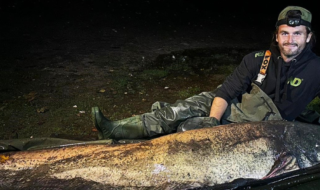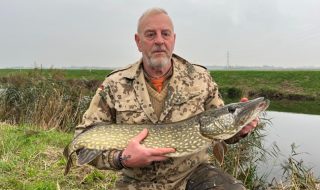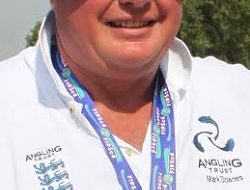Angling Trust publishes ‘dossier of destruction’ highlighting the case for better control of cormorants and goosanders
The Angling Trust has today published a comprehensive 10,000 word report highlighting the damage done to fisheries and wild fish stocks in the UK as a result of a fifteen fold increase in cormorant numbers over the last 25 years. The report includes a comprehensive case study on the decline of the Hampshire Avon as a fishery, technical data from recent Environment Agency surveys of fish stocks in a number of key catchments, alarming evidence on the impact of cormorants on the endangered eel population and case studies of unsustainable avian predation from across the country.
The dossier has been sent to Fisheries Minister Richard Benyon and to MPs from all parties who have backed the Angling Trust’s campaign for more protection for fisheries. It was launched with a photocall with Charles Walker MP (Chair of the All Party Parliamentary Group on angling), along with the AT’s Mark Lloyd and Martin Salter.
Report highlights
• The Angling Trust has been campaigning for nearly 3 years to change the licensing regime for the control of cormorants and goosanders. As part of this process, anglers have recorded nearly 70,000 sightings of these birds throughout the country in the past year at www.cormorantwatch.org.
• Cormorant numbers have increased since protection was introduced in 1981 via the European Wild Birds Directive. Numbers of over wintering birds, which traditionally were around 2,000 in the sixties and seventies, rose dramatically to 14,554 in 1987/8 and to a peak of 30,188 in the winter of 2003/4 – a doubling of numbers in 6 years and a staggering 15 fold increase in just over 20 years.
• The Environment Agency’s Eel Management Plans submitted to the European Commission under the Eel Regulation has made eels the most protected fish in Europe due to the collapse of their population numbers, yet the plan estimates of the number of eels consumed by cormorants in inland and estuarine waters in England and Wales to be between 29-43 tonnes.
• The number of over-wintering cormorants is currently estimated at 23,000. Each individual bird eats at least one pound of fish every day, which equates to 2,760,000lb of fish lost each winter.
• Numbers have increased by the influx of the migrant European sub-species Phalacrocorax carbo sinensis from mainland Europe.
• The biodiversity of our rivers and still waters is at serious risk from excessive predation from cormorants and goosanders whose numbers have exploded in the last two decades to unsustainable levels.
• Rivers and waterways are failing under the Water Framework Directive and of those failing more than 50% do so due to poor fish stocks. The Angling Trust and Fish Legal are pressing for concerted action on abstraction, pollution and habitat damage, but fish stocks need urgent protection NOW from predation.
• Cormorants and goosanders inflict serious injuries on fish too big for them to eat leaving them vulnerable to disease and death.
• Action is needed now to allow angling clubs and fishery owners to protect their fisheries better and there is a strong case for cormorants to be placed on the general licence giving them the same status as rooks, jays and magpies.
The government is shortly to respond to the recommendations of a special DEFRA review group which are expected to include proposals to reduce the current restrictions on cormorant licensing by Natural England. At the moment applicants have to go through a complicated and bureaucratic procedure that often results in a wholly inadequate outcome providing little protection for the fishery and is expensive for the taxpayer and rural businesses.
Angling Trust Chief Executive Mark Lloyd said:“This ‘dossier of destruction’ is just a sample of the thousands of angling clubs, fisheries and rural businesses which have suffered damage from cormorants and goosanders destroying their fish stocks. I am very pleased that the Minister, and his team at Defra, have taken such a close and careful look at this problem and are identifying a range of options for responsible and protection of our nation’s freshwater fisheries from unsustainable predation.
The Angling Trust will work with our members to ensure that the government’s chosen option is implemented responsibly and proportionately.”National Campaigns Coordinator for the Angling Trust Martin Salter added:“We know that some have tried to claim that cormorants and goosanders are not a problem or that there is no evidence to support a change in the current woefully inadequate licensing system. This report nails that claim once and for all which is why we have sent a copy to Environment Minister Richard Benyon and all the MPs who have contacted the Angling Trust in support of our Action on Cormorants campaign. Our vulnerable fish stocks in this country deserve better protection and we are hopeful that this time the politicians are listening.”High profile supporters of Action on Cormorants include TV presenter and keen angler Chris Tarrant and former RSPB film maker Hugh Miles.
Celebrity angler Chris Tarrant who attended the campaign launch last year said:“Freshwater fisheries provide easy pickings for cormorants and they can drain a river system or lake of silver fish, in a matter of days. I was shocked how long it took to accept that research was proving time and again what a massive problem they were but we must give people whose livelihood depends on their fisheries a clear mandate to reduce the numbers of their local cormorant population”.Award winning wildlife film maker Hugh Miles added:“The cormorant is a silver fish killer unparalleled in nature whose numbers have increased to such an extent that the middle reaches of many rivers are now all but devoid of once common and sought after species such as roach and dace.
Well balanced ecosystems need a healthy balance between predator and prey and we need action now to restore that vital balance and give our fish a chance.”Trevor Harrop from the Avon Roach Project said:“We give our hearts and souls trying to reinstate a self-sustaining population of roach in the Hampshire Avon, once one of the most iconic rivers in the country, but the Avon is just one of our priceless ecological jewels that is being plundered on an unsustainable level every day by the huge number of cormorants over wintering in this country. These birds are having an unimaginable impact on our biodiversity and fragile ecosystem and are possibly the biggest threat, not only to our roach but to other endangered species, which we must be allowed to protect.”





